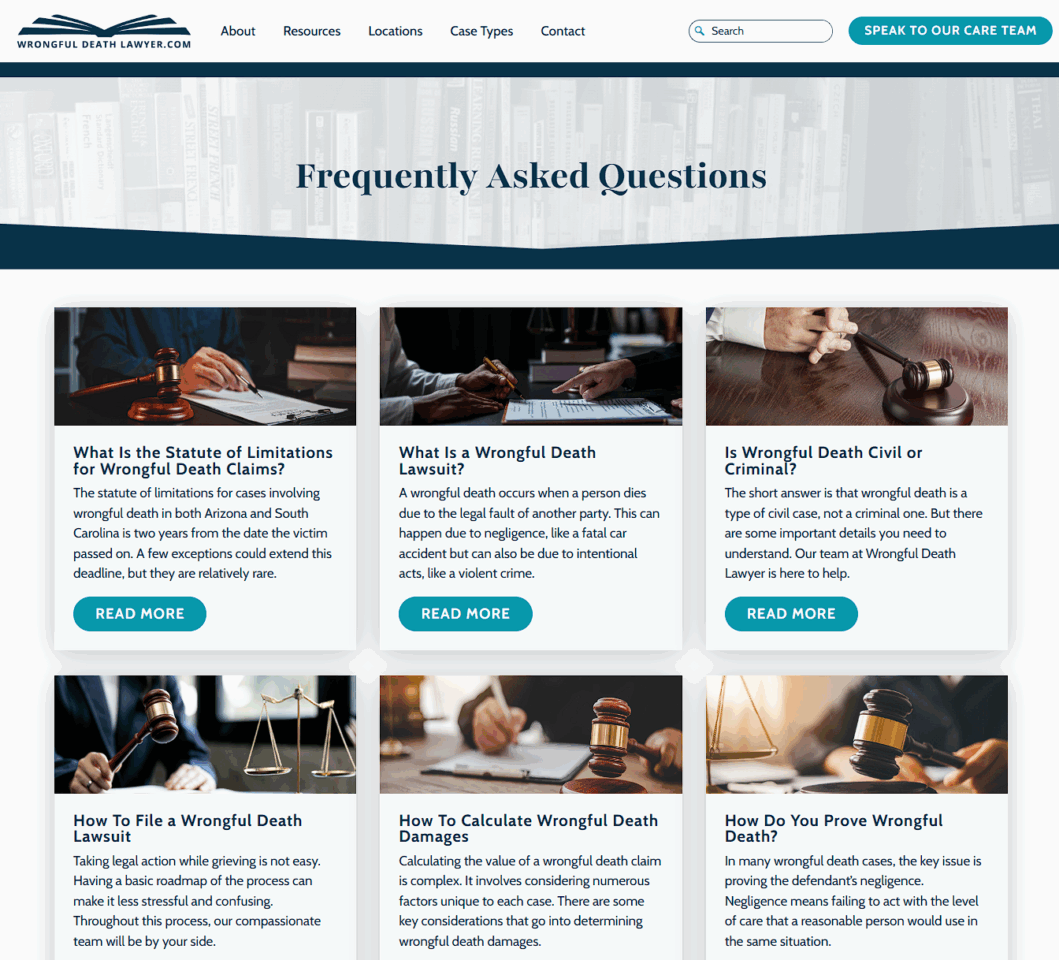11 Attorneys Share 15 Small Law Firm Marketing Ideas
There are many ways to grow a small law firm, but which one of them works? In this article, we share real-life insights from lawyers who found success in growing their practice to what it is today.
1. Strike Direct Referral Partnerships With Other Attorneys
Getting direct referrals from other lawyers worked for Alabama-based attorney, Shane Lucado. He now runs InPerSuit, a legal services marketplace that helps people connect with lawyers.
To get consistent referrals, Lucado incentivizes lawyers who refer clients to his firm.

Direct referral systems with structured incentives change the game. A lawyer sending you business should get something beyond a thank-you email. That might mean co-counsel fees, shared webinars, or quarterly lead swaps.

Lucado also emphasizes the importance of creating a system to track all referrals and reach out to all of them, saying, “Most small firms have access to 20 referral candidates but only actively talk to 3. That is a lost pipeline. Build a spreadsheet of 12 referral sources and assign a contact date and follow-up frequency. Run that like you would any case schedule. Marketing is not magic. It is consistent output with a system behind it.”
Getting referrals from other lawyers takes time. You need to put yourself out there by attending legal events, meeting lawyers from a practice complementary to yours, and building positive relationships with them, with the likelihood of getting referrals from them and vice versa.
When you start getting referrals, you can adopt Lucano’s incentive system or simply thank the referring lawyer for the lead. It’s up to you! The key is to always thank lawyers who referred clients to you.
To track your referrals, you can use a spreadsheet or opt for law firm CRMs for better integration with your firm’s workflows. Below is an example of a legal management dashboard by Lawmatics, specifically a feature that allows users to enter referrals.

2. Print Guides and Case Breakdowns And Mail Them to Potential Clients
Personal injury lawyer Nate Baber uses direct mail to send printed guides to potential clients. In these guides, he shares detailed advice about a specific personal injury matter based on past client cases. He does this to stay away from generic content and offer something valuable to those receiving these guides.

I have seen the best marketing come from doing something useful and making sure people know about it. Publish short guides on topics your clients deal with weekly, not hypotheticals. A two-page handout on what to do if you are injured on the job or if your paycheck bounces can reach more people than any ad. Print 50 copies and deliver them to three local churches or union halls. It costs less than $100 and gets remembered because it solves a real problem.
Avoid templated marketing. The public knows when a firm is recycling boilerplate language from an SEO vendor in another time zone. Instead, write 3 short case breakdowns in plain English. Detail how long the case took, how much your client recovered, and who they were up against. Mail that to 300 homes in the ZIP code where your client lives. People remember what is real.

Follow this strategy with these steps:
- Write the guide. Choose the topic you want to discuss in the guide and write the content. Make sure it’s concise but comprehensive, covering the most common questions clients have about the topic.
- Print the guide. You can do this using your printer or hire a professional printing service to ensure high-quality printouts.
- Create a mailing list. List all addresses of businesses and organizations to which you plan to mail the printed materials. Ensure you comply with legal and ethical standards when getting contact information.
- Mail the printed materials. Use reliable mailing services with first-class or targeted bulk mailing for better delivery.
- Track responses. Track the leads that come from your printed materials to measure the effectiveness of this campaign.
3. Be Client-Centric
One of the best ways to attract potential clients is to provide a great client experience. Law firms that take the time to listen to every client’s concern and express empathy while providing professional service are likely to be recommended and referred to by past clients.
Divorce attorney Jeanette Soltys shares that making clients feel heard and supported did wonders for her firm’s growth and online reputation.

At my firm, we make the client’s holistic well-being the north star. And when you do that, you win in the long run. Clients feel seen, respected, and supported. That turns into goodwill. And practically speaking, that goodwill becomes positive online reviews, steady word-of-mouth referrals, and a reputation that brings in clients who want exactly what we offer.

This philosophy of serving her clients works wonders for Jeanette, as evidenced by one of the many positive reviews about her excellent service:

4. Stay Transparent With Clients
A huge deciding factor for people to hire a lawyer is trust. Potential legal clients want assurance that they are getting competent and efficient legal services for the money they’re going to spend.
This is why personal injury attorney Christian Simpson ensures transparency with all his clients. He explains that small law firms should be honest with their clients if they are to maintain a harmonious relationship with them throughout their case:

As the principal attorney at Christian Crash Law, I’ve found that leveraging client-centered service is crucial for small law firms. By prioritizing personalized communication and transparency, we’ve built trust with clients, which leads to referrals and repeat business. For example, ensuring our clients understand their social media’s impact on their cases has strengthened our relationships and reputation as a caring firm.

5. Make Your Legal Consultations More Accessible
As a small law firm, you can leverage technology, specifically video calls, to talk to potential and existing clients even if they can’t meet you in person. Providing this option already sets you apart from the competition, especially big law firms whose lawyers might not have the time to go on a video call for a free consultation.

Understanding the nuances of distance communication has been a game-changer. By adopting secure video conferencing tools, we’ve made legal consultations more accessible, especially for clients unable to travel due to injuries. This approach has not only improved client satisfaction but also expanded our client base, demonstrating how tech adoption can be a vital marketing tool for small firms.

Offering remote consultations to potential clients is becoming a common practice, and if you have a growing firm, it might just be why someone hires you over the competition. A 2021 Clio Legal Trends Survey showed that 79% of consumers look for a remote option when working with a lawyer.

6. Build Strong Relationships With The Community
While digital marketing is great for growing a small law firm, traditional law firm marketing events, such as community involvement and legal networking, can help you build meaningful and mutually beneficial relationships with clients, fellow lawyers, and organizations related to your practice.
- Host workshops related to your practice area
Nick Norris, a partner at Watson & Norris, PLLC, which specializes in employment law, says that hosting free legal workshops has helped immensely with establishing his firm’s presence in the local community.

“’Ive found immense value in building meaningful relationships with clients and the community. Through the years, one standout strategy has been hosting free informational workshops about employment rights, which we offer in local communities. This initiative not only provides valuable information to potential clients but also positions us as approachable experts in this field.

William London of Kimura London & White LLP says that hosting these educational events helps him attract leads while showing expertise in his field.

Hosting educational seminars is a great way for small law firms to attract clients and build authority. Pick a topic clients care about (e.g., divorce, estate planning, business law). Choose a venue like libraries, community centers, or host online via Zoom. Promote it with Facebook/Google ads, email marketing, and local groups. Engage attendees with Q&As, free guides, and consultation offers.Repurpose content by posting clips on social media and using questions for blog posts. Regular seminars keep your firm top of mind and generate leads.

In the example below, law firm Dutton Casey & Mesoloras partnered with Catholic Cemeteries to provide a free seminar on estate law.

Events like these are great for establishing awareness for people in your community, and they’re more likely to remember your firm when they need your services.
7. Sponsor Local Events
Hosting and sponsoring local events can benefit small law firms because it connects them not just with possible clients, but with organizations that align with a firm’s values and advocacies.
Greg Herman of Herman & Herman Personal Injury Lawyers explains the benefits of sponsoring local events, like this one for Easter:

Herrman says that having a presence in the community isn’t just to get referrals and leads, but to offer help and support to people who need it.

We’ve found that actively participating in community events creates meaningful connections with potential clients. Sponsoring local events, attending charity fundraisers, and supporting school activities can put your firm in front of people in a positive, helpful way. When people see you engaged in their community, they are more likely to remember and trust you when they need legal assistance.

8. Provide Pro Bono Services
While it’s great to participate in your community, you can go a step further and provide pro bono services to support and advocate for clients. This demonstrates a law firm’s commitment to its community by making a difference in the lives of its people.

Our firm provided pro bono services, and actively engaged in bar association activities. This local footprint cultivates trust and cultivates referrals, as those in the community view us as both accessible and committed to supporting the region’s legal needs.

9. Try Grassroots Marketing via Social Media
Small law firms can use social media as part of their law firm marketing strategy to connect with local organizations and share each event with their followers. Greg Herrman of Herrman & Herrman P.L.L.C. mentions that social media plays a big role in establishing a presence in the local community.
Herrman says that: “Social media plays a huge role in grassroots marketing. Posting about community involvement, sharing behind-the-scenes firm updates, and engaging with local events on platforms like Facebook, Instagram, and LinkedIn helps build recognition and credibility. Small firms can also use platforms like Nextdoor to connect directly with people in their area.”

10. Build Relationships By Starting a Local Business Network
If you’re serious about building long-term partnerships in your community, consider creating a networking platform.
Personal injury lawyer Mark Hirsh founded Prime Time Business Network, an exclusive networking group in South Florida, which has over 400 members working in different industries.

I’ve also had success through relationship-building by founding Prime Time Business Network, which connects professionals across industries and naturally leads to referrals.


11. Embrace Who You Are to Build Client Trust
Showing your personality to your audience can be a huge factor in winning over new clients.
Jeanette Soltys of Atlanta Holistic Family Law shares her experience in using short-form videos to connect with her audience and attract prospective clients.

As a family law attorney running a small firm, I’ve learned that the most effective marketing comes from embracing who you are and how you genuinely want to serve people.
For me, that meant leaning into TikTok. I enjoy being on camera, so creating short-form videos felt natural. Over time, I’ve built a following of nearly 40,000 people on the platform, where I post as @atlholisticfamilylaw. It is not about chasing attention. It is about showing up consistently and offering something real and helpful. I use that platform to educate and to shift the narrative around family law.

Here’s Jeanette’s TikTok page, where she regularly posts short clips of her discussing issues about divorce and other related topics.

But Soltys adds that lawyers don’t necessarily have to make videos to express themselves, saying, “The strategy only works if it aligns with who you are. If you do not enjoy being on camera, then TikTok might not be the best fit. Maybe your strength is writing, public speaking, or building partnerships. Whatever it is, lean into that. Authenticity creates trust, and trust is what grows a law firm.”
12. Focus on Local SEO
Local SEO is a strategy that aims to establish online visibility for your firm in areas that you serve. There are many methods to achieve this, including creating a Google Business Profile and listing your firm in online directories.
Criminal defense lawyer Michael Oykhman shares how local SEO campaigns helped in his marketing efforts.

For us, focusing on location-based SEO can seriously increase our chances of drawing local clients right to our doorstep. This tactic is super useful, especially when potential clients are on the hunt for legal services in our area.
So, what’s involved with using location-based SEO? It goes beyond basically sprinkling your city’s name across your website. We hone in on generating content that dovetails neatly with your specific practice areas and our community. I also recommend getting your firm listed in important legal directories and improving your Google Business Profile as much as you can.

Divorce attorney Jeanette Soltys also says that SEO is important to her law firm marketing plan because it helps people find her legal services when they need them, saying: “I have also invested heavily in SEO and content. It is a long-term strategy, but it pays off every day by making sure the right people can find us when they need help.”
13. Create Hyper-Specific Landing Pages
A great way to optimize your law firm website is to create web pages with a specific topic and purpose. This one from Farah & Farah Personal Injury Attorneys is an example of a landing page that targets a location (Atlanta) and a specific legal issue (social security disability).

Litigation lawyer Shane Lucado believes that hyper-specific landing pages are more effective than paid ads.

Proximity marketing through hyper-specific landing pages generates better client quality than broad digital ads. A firm that litigates construction cases in Mobile should have a page titled “Mobile Construction Delay Lawsuits” that explains, in plain English, what a $50,000 delay claim looks like. That page should list pricing terms, response time, and one contact method with an actual name. People file lawsuits when they feel ignored, not when they feel informed. Clarity wins over branding. If a small firm produces five pages like this per month, they will outpace anyone chasing SEO gimmicks or social posts with slogans.

14. Answer Audience’s Frequently Asked Questions
Some people may not need to hire a lawyer right away, but have questions about a legal issue. This is where Frequently Asked Questions content comes in handy.

Personal injury attorney David Haskins explains that FAQs help inform potential clients about the law. Even though these pages are not likely to result in leads, they help establish brand awareness among your audience.

Many people hesitate to contact a lawyer because they’re misinformed about the law, so I created a FAQ series that clears up common misconceptions. Instead of dry legal explanations, I tackle myths head-on, like whether wrongful death settlements are taxable or if verbal contracts hold up in court. These short videos or blog posts provide clear answers in a way that’s easy to understand and share.
People appreciate when a law firm simplifies legal complexities rather than making them feel more confusing. This builds trust and keeps my firm top of mind when someone eventually needs legal help. Educating the public isn’t just good marketing–it’s a service in itself.

15. Designate Roles Between Partners
A law firm’s success is highly dependent on its partners. It’s important that all lawyers in a firm, even if it’s just two or three, know their strengths and how to leverage them to ensure that the firm grows and succeeds.
Seth Price of Price Benowitz shares how he and his partner, David Benowitz, had specific roles in the firm.

David Benowitz and I had become friends as freshmen at Penn in the late ’80s and ended up at law school together. By the time we decided to join forces to open a law firm a decade later, we managed to avoid a lot of those founder headaches by starting with a clear division of labor.
We were both attorneys, but we knew who would do what. David would focus on representing clients. I would make the phone ring.”

Today, their firm has grown to 50 attorneys in multiple states. Even with this massive success, Price says, “David’s still doing a great job representing our clients. I’m still working to make the phones ring. And somehow, we’re still friends.”
Final Thoughts
Growing a law firm takes time, but it’s completely possible to grow your online presence, attract new clients, and boost your revenue when you learn how to implement sensible small law firm marketing strategies.
But it won’t be sustainable in the long run. Once you’re seeing results and getting more cases, then you might not have the time to do any marketing at all. If you can allot a marketing budget of $3k to $5k a month, then it might be the best time to outsource your marketing projects to an agency so you can focus on serving your clients.
On The Map Marketing has years of experience with helping small law firms establish an online presence and grow their clientele with successful strategies that work.
Ready to achieve your small firm’s marketing goals? Contact us to get started!
Table of Contents
Related Articles
Dominate Your Market with Digital Marketing Services That Deliver
Talk to a certified professional today, and we will design a strategy specific to your case.







